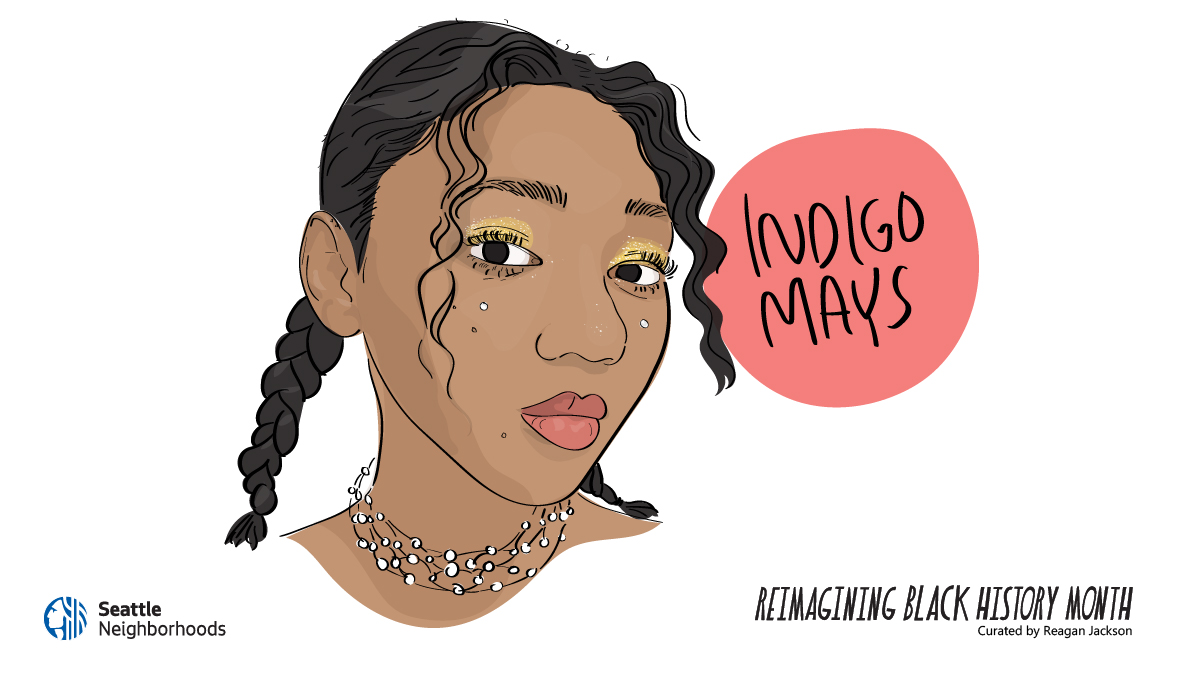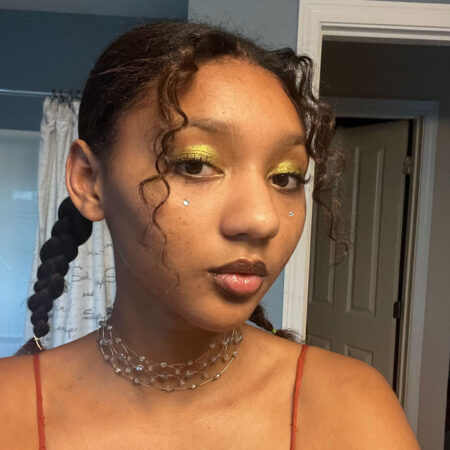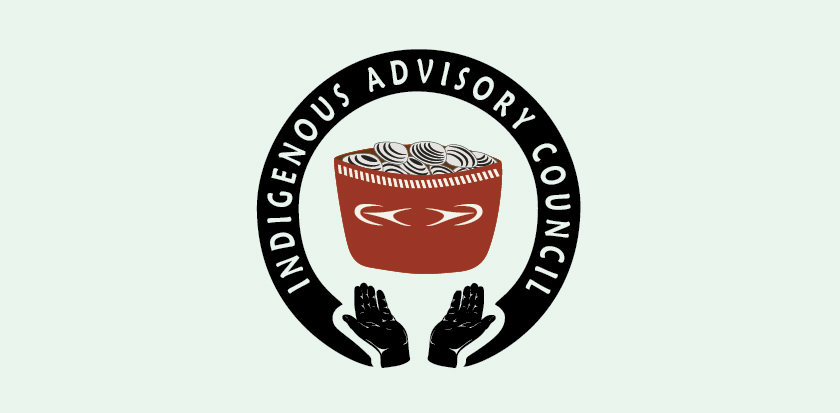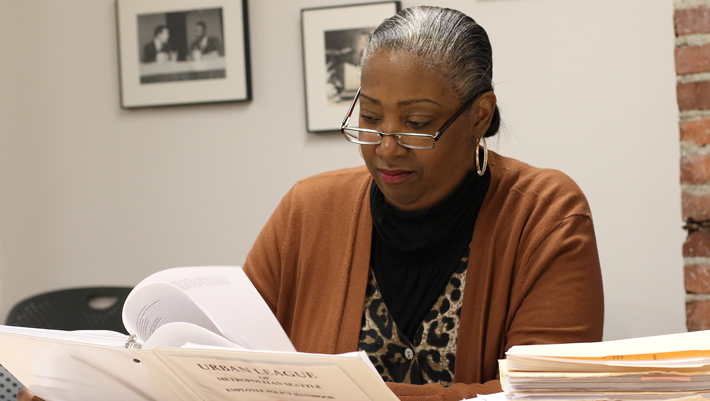
In celebration of Black History Month, we have invited community leader and activist, Reagan Jackson, to curate a series of community stories and profiles that both amplify the Black experience right now and imagine a new Black future in Seattle. Stories will be published throughout the month under #ReimaginingBlackHistoryMonth.
Redefining Blackness
by Indigo Mays
What is Blackness? I am not referring to people whose ancestors descend from Africa, but the cultural phenomenon that is being Black. One can be African American, but not Black, just as one can be African American and Black. I happen to fall into the Black and African American demographic, but if you asked what it means to be Black, I couldn’t tell you.
Blackness itself means so many things in our past, present, and future so you can’t sum it up with words. It’s a culture, a fashion, an unwritten constitution, a lens, a lifestyle, an expectation, a feeling, a motivator, the change, the radicality, the possibility, the past, the present, the future; it’s everything.
I descend from a lineage that can only be traced back to the brutalist ships on which my ancestors were forced to the Americas. I was born to a Black mother and father in a Black neighborhood in the Black city of Atlanta. From a young age, I was exposed to the civil rights era and its prominent figures. Princess Tiana was my favorite princess, and my Black friends and I would argue about who got to play her when we’d play pretend. I was born into Blackness, existing with no length of white audacity in sight. There was no question as to what I was or who I belonged to or even the nuances that come with inherited Blackness.
I know there are good ways to be Black and bad ways. Black women with hair like that of a celestial goddess, nails that defy the laws of physics, and makeup that perfectly complements their skin tone are good Black women. Those who have the audacity to walk outside the house with 4c hair are bad Black women. One must not cross the line of being too done up, as that also makes you a bad Black woman. While one can’t have 4c hair in natural form, they must have some sort of texture, but they also can’t have too much texture, which will therefore still make you a good Black woman.
A good Black woman reaches for the stars in every way possible, never straying from her ever-far-growing goals. She does everything perfectly, adding her name to the list of Black firsts with every new endeavor. A good Black woman seems to strike a perfect balance between AAVE (African American Vernacular English) and white English, never too far on one end or the other. A good Black woman knows when to speak up and when to shut up; never too radical or too submissive. A good Black woman knows how to control her emotions, perpetually balanced between being vulnerable and still being professional. A good Black woman adheres to the few ways in which change occurs; always nonviolent, and always when white people are accepting of it. Those who don’t exist in this cradle of perfection are subject to being typecast as ghetto or whitewashed.
Does being Black mean not being whitewashed? The word itself in its syllables and imagery is so rough, so there are other ways to say it; Oreo, wannabe, shackled, and other more creative and indirect insults. I once feared the word and the animosity that comes with it. I associated being whitewashed with a hatred for Blackness and a denial of the fight for our right to exist. Those who were whitewashed were ignorant of their rich and detailed history, blind to the nuances of their existence. I, a person who proudly wore their Black Panther Party sweatshirt on the playground at recess, who dressed up as Rosa Parks for Halloween, who has a Malcolm X poster adorned in my room couldn’t possibly be whitewashed, right?
I can’t be sure of when I started to feel insecure about my Blackness, but I do remember my first memory of a person saying it to my face. “You look Black, but are you sure you’re not mixed with something? Like you’re Black on the outside but you act like a white girl.” It didn’t affect me when it first happened, but the question ate away at me in the coming weeks. I felt like I was under a constant microscope, one that could see whiteness oozing out through my crevices.
I’ve since met other Black Girls who’ve faced this dilemma, like my Black friends in the back of homeroom, both of whom listen to Dear Evan Hansen and other showtunes. How could it be that I inherited all this Blackness, seasoned, marinated, and baked into the diaspora, but still was questioned in the commitment to my people?
Is having Black friends what makes you Black? Is it laughing away at jokes your white friends awkwardly grin at in ignorance? Is it not having to explain why that one person’s comment was weird, or having oddly identical life experiences? Is it realizing you know somebody they know because our communities are so tiny? Is it finding out yet another person was killed by the police and not having to say anything but just sit, already being reminded that it could have been your brother or uncle or father?
Does being Black mean repelling mediocrity? I knew the meaning of mediocre before my other peers did, defining the term as when something is slightly less than okay or average. Nobody should aim for mediocrity, as we’ve worked so hard to defeat the notion that we are destined for mediocrity. Realizing that not everybody came from a people who fought off these notions made me question why we work so hard to attain exceptionalism. Black mediocrity seems to stick to a person and define them. When a white person wears sweats and messy hair one day, they can still be taken seriously. That one moment of unprofessionalism will not define them or their personality. It’s lethal to always have to prove that you are deserving of others’ time and validation.
Do you have to work yourself until your fingers wilt and your body aches? Is that what it takes to be Black? The constant exhaustion and stress are what I see uniting so many Black women today. If we are not pillars, true anomalies, we are not wanted, desired, or needed. I’ve realized my fear of failure is what drove me to live so much of my life, a fear that if I wasn’t extraordinary, I wasn’t wanted or needed. However, I never applied that mindset to my white friends with no extracurriculars, they were near and dear to me despite their regularities. I realized not everyone fears a possible future of loneliness, stagnancy, and poverty.
When a Black person messes up, it’s who they become. No matter how much or how little truth there is to this. This has been taught and ingrained into the Black woman for decades if not centuries. Everything we do, say, and think stands for so much more than us. We exist as representatives of Blackness. It’s why everything is, in fact, “a race thing” – why you can’t just forget the way that one white person looked at you funny. Everything seems to magnify and mean so much more when you’re Black.
The act of defining Blackness, to put a border around the ever-reaching existence of Blackness suffocates all involved, especially the Black people who maintain this enclosure. It is so beautiful and vibrant while also being hollow and dark, just like the skin we so bravely show. When so much of our histories have been redefined for the white pallet, definitions of our people used as fuel for racism and violence, why must we still cling to finite definitions of what it means to be Black? In a time where so many of us are still fighting to survive, I can see how these definitions are a means of survival, a hope for a better reality. However, what was once helpful became a way in which we police ourselves during a time when we are already over-policed. I hope the future of our people is one of vibrancy and a celebration of uniqueness, something that has always been present but not elevated.
I hope the future of our people is one where questioning what it means to be Black doesn’t exist. I hope the act of Blackness will be clear: to exist in the best version of yourself whilst appreciating and uplifting your people with the radical acceptance of all fellow kinfolk.



